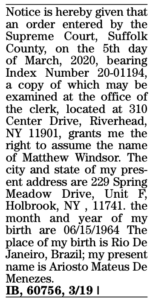Views
Brazilian Ruling Recognises US Name Change
Written by Prof Dr João Costa-Neto, Assistant Professor, Faculty of Law, University of Brasília
and Dr Pedro Pagano Payne, Academic Assistant, Faculty of Law, University of Brasília
In April 2025, the highest chamber (Corte Especial) of the Brazilian Superior Court of Justice (STJ), under Justice Maria Isabel Gallotti as rapporteur, ruled on  ‘Recognition of a Foreign Judgment’ (HDE) no. 7.091/EX. The case concerned the recognition of a United States ruling changing the last name of a Brazilian national who had acquired US nationality. The Plaintiff sought recognition of (i) his US naturalisation and (ii) a ruling of the Supreme Judicial Court of Suffolk County, Massachusetts, which changed his name from ‘Ariosto Mateus de Menezes’ to ‘Matthew Windsor’. Read more
‘Recognition of a Foreign Judgment’ (HDE) no. 7.091/EX. The case concerned the recognition of a United States ruling changing the last name of a Brazilian national who had acquired US nationality. The Plaintiff sought recognition of (i) his US naturalisation and (ii) a ruling of the Supreme Judicial Court of Suffolk County, Massachusetts, which changed his name from ‘Ariosto Mateus de Menezes’ to ‘Matthew Windsor’. Read more
Anti-Arbitration Injunction in Foreign-Seated Arbitrations: The Delhi High Court’s Controversial Intervention in Engineering Projects (India) Limited v. MSA Global LLC (Oman)
This post is posted on behalf of Arnav Sharma, Jindal Global Law School, Sonipat, India
Introduction
On 25th July 2025, a single judge bench of the Delhi High Court delivered a judgment in Engineering Projects (India) Limited v. MSA Global LLC (Oman) in CS (OS) 243 of 2025[1] that has stirred considerable discourse in international arbitration circles. The fundamental question at issue in the instant case was whether an Indian Court can grant an anti-arbitration injunction to stay proceedings in a foreign-seated arbitration on grounds of the proceedings turning oppressive and vexatious due to procedural impropriety, notwithstanding internationally well-settled principles of minimal judicial intervention, party autonomy, and lex arbitri that govern international commercial arbitration? The Delhi High Court answered in the affirmative, holding that Indian civil courts possess inherent power under Section 9 read with Section 151 of the Code of Civil Procedure, 1908 (“CPC”) to intervene under exceptional circumstances where the arbitral process itself becomes a vehicle of abuse.
Cross-Border Personal Data Transfers: The Remaining Issues Following the Indonesian Constitutional Court Decision
Written by Dr Priskila Pratita Penasthika, Assistant Professor, Faculty of Law, Universitas Indonesia
INTRODUCTION
The Indonesian Personal Data Protection Law, Law Number 27 of 2022 (Indonesian PDP Law), came into effect on 17 October 2022. Before its enactment, data protection rules in Indonesia were fragmented across different sector-specific laws and regulations. The Indonesian PDP Law aims to unify these laws and regulations, providing greater clarity and ensuring consistent personal data protection across all sectors in the country. The Indonesian PDP Law sets out normative provisions on personal data protection; however, detailed, practical rules have yet to be specified in the implementing regulations. As of now, the drafting of these implementing regulations is still underway. Read more
News
Call for Papers: 11th Journal of Private International Law Conference (Zurich, 1–3 April 2027)
The following Call for Papers has been kindly shared with us by Christiane von Bary (University of Zurich):
Following the 20th Anniversary Conference in London (2025), we are pleased to announce that the Journal of Private International Law will be holding its 11th Conference at the University of Zurich from 1 to 3 April 2027.
We are now inviting the submission of paper proposals for the conference. Please submit an abstract if you would like to make a presentation at the conference and you are willing to produce a final paper that you will submit for publication in the Journal. Abstracts should be up to 500 words in length and should clearly state the name(s) and affiliation(s) of the author(s). Participants are also welcome to propose collective panels. If the proposal is for a panel, it should include the names and affiliations of all proposed participants.
Presentations can be on any subject matter that falls within the scope of the Journal and can be offered by people at any stage of their career, including postgraduate students and practitioners. Presentation at the conference will depend on whether your abstract is selected by the Editors of the Journal (Professor Jonathan Harris KC, King’s College, London and Professor Paul Beaumont FRSE, University of Stirling) and the conference organisers (Professors Tanja Domej and Christiane von Bary, University of Zurich). The subsequent article should be submitted to either of the editors of the Journal before the end of 2027. Publication in the Journal will be subject to the usual system of peer review.
The Conference will be held at the University of Zurich. There will be a mixture of plenary and parallel panel sessions. Speakers will not be expected to pay a conference fee but will be expected to pay for their own expenses in relation to their attendance at the conference in Zurich. Non-speakers will be expected to pay a conference fee. A conference dinner will be held on Friday (2 April 2027), at additional cost and with limited places. Details about registration, the conference dinner and options for accommodation will be made available on the conference webpage: https://t.uzh.ch/1WV.
Please send your proposal to the following e-mail address by Tuesday, 30 June 2026:
We look forward to receiving your proposals, and to welcoming you to Zurich in April 2027!
Conference: Assimilated law – the role and future of retained EU law in the UK (Oxford, 13/14 April 2026)
The following conference announcement was kindly shared with us by Johannes Ungerer (University of Oxford).
At the University of Oxford, a conference on “Assimilated law – the role and future of retained EU law in the UK” will be held on 13 and 14 April 2026. It is jointly organised by Professor Anne Davies and Dr Johannes Ungerer; it is funded by the Institute of European and Comparative Law as part of its 30th anniversary events.
The concept, category or chimaera of assimilated law emerged in the UK after Brexit: when becoming a Non-Member State, the UK chose to retain many EU laws in its domestic legal system, and this body of law has since been labelled ‘assimilated law’. There is an urgent need to explore and understand how assimilated law operates and might develop in future in the UK. Pressing questions concern how assimilated law is to be applied and interpreted and how it and the underlying EU laws might develop and diverge over time. Courts in the UK and on the Continent already had to deal with complex matters arising with regard to assimilated law, so there is a real need to distil and disseminate academic insights. In Lipton, the UK Supreme Court dealt with some initial questions, but they only addressed a small portion of the underlying issues.
The conference will bring together legal scholars and practitioners to establish a common understanding of the practices and challenges regarding assimilated law. The conference will be structured in two parts over the course of one and a half days: first, general questions about assimilated law will be debated, so that common themes, trends, and topics can be explored. Secondly, particularly tricky issues will be addressed which pertain to assimilated law in specific areas.
Further information, including the conference programme, is available here.
JKU Linz: Tenure-Track Position for European and International Civil Procedure Law
Johannes Kepler University Linz is currently advertising a tenure-track professorship in “European and International Civil Procedure Law”.




